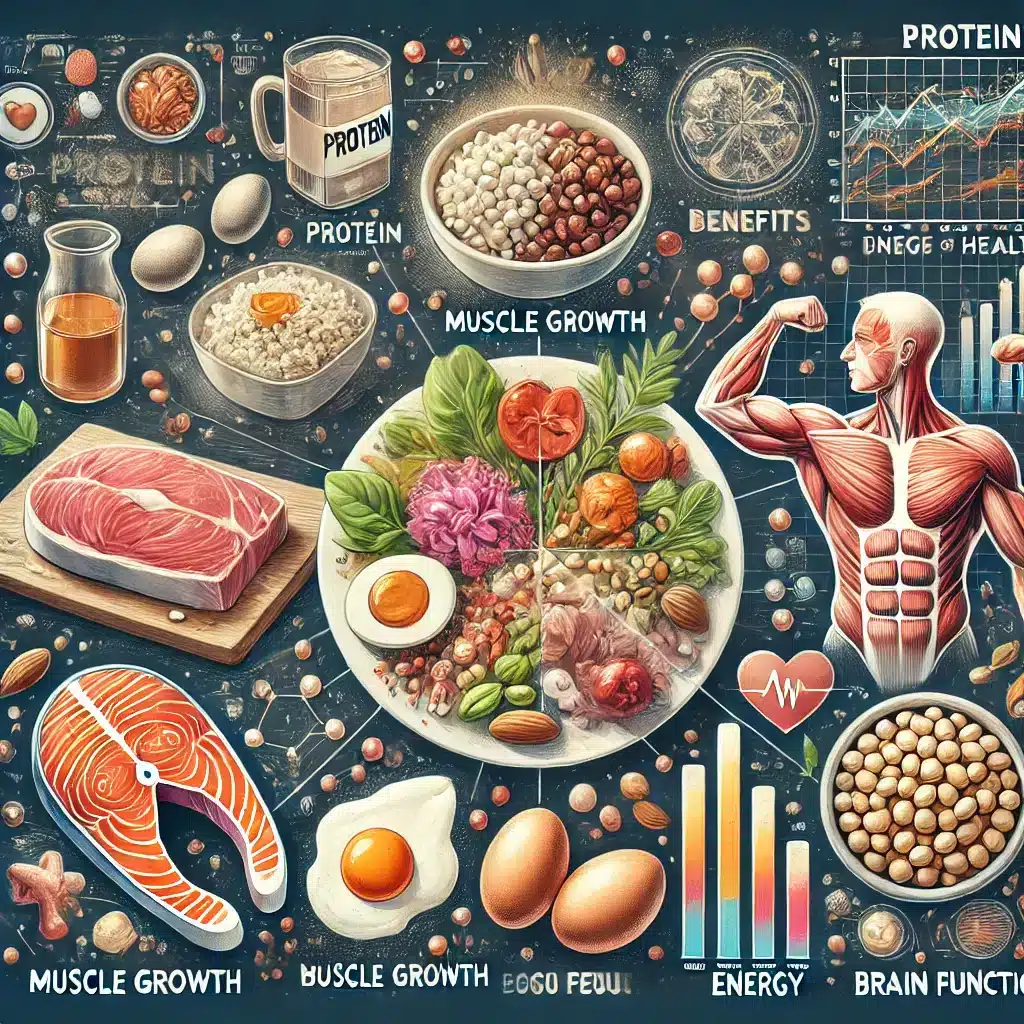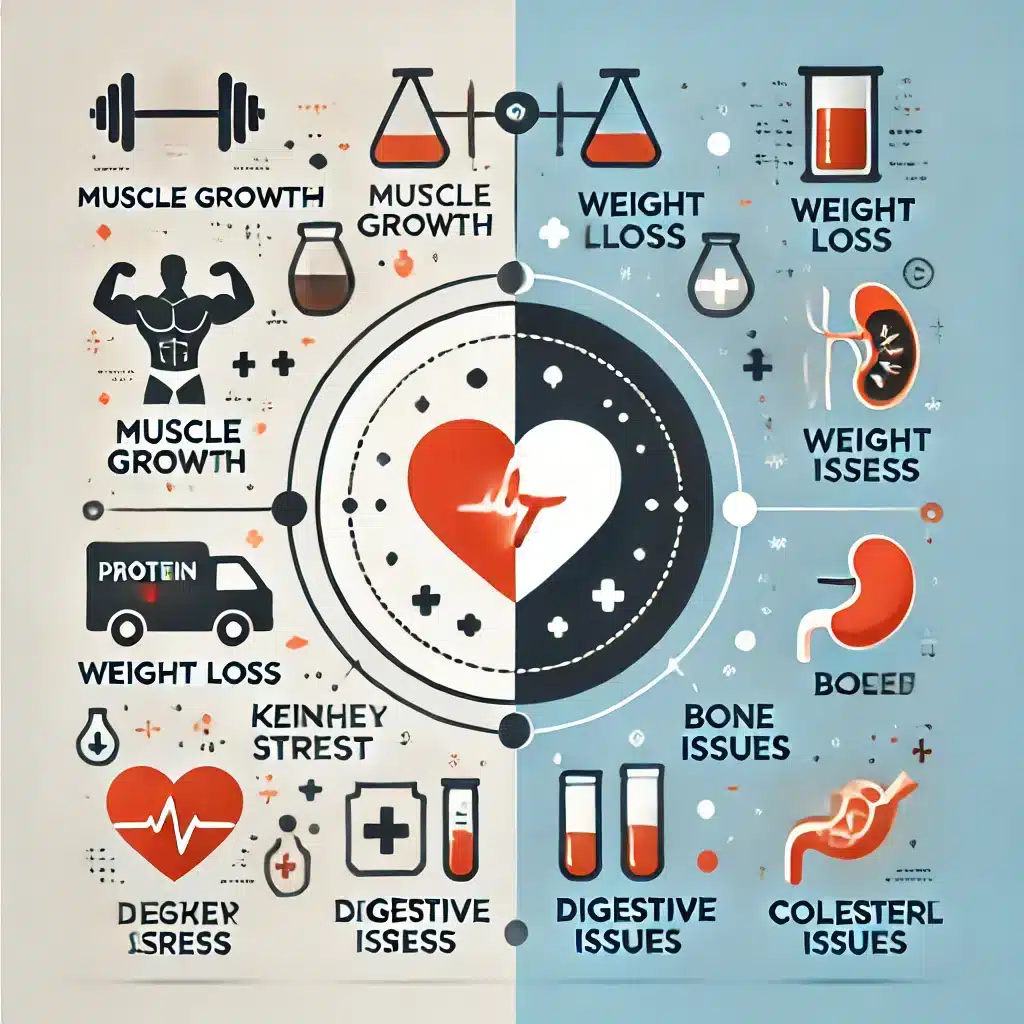Introduction
Protein is one of the three main macronutrients essential for life and the proper functioning of the body. Made up of amino acids, it plays a vital role in the structure and function of all the body’s cells and is recognized as a key component of a healthy diet. This article explores the definition of protein, along with its benefits and drawbacks.
What is protein?
These nutrients are large molecules made up of chains of amino acids. The human body requires 20 different amino acids, 9 of which are considered essential—meaning the body cannot produce them and they must be obtained through food. The sources of this nutrient are divided into two main categories:
- Animal proteins: meat, poultry, fish, eggs, and dairy products.
- Plant proteins: legumes, nuts, seeds, soy, and whole grains.
The role of protein in the body
Muscle-building nutrients serve multiple functions in the body, the most important of which include:
- Tissue building and repair: Proteins are essential for rebuilding muscles, skin, and the body’s internal organs.
- Production of enzymes and hormones: Many enzymes and hormones, such as insulin, are made from protein.
- Nutrient transport: Some proteins, such as hemoglobin, play a role in transporting oxygen and nutrients throughout the body.
- Strengthening the immune system: Antibodies, which are part of the body’s defense system, are made from protein.
- Providing energy: In times of carbohydrate and fat deficiency, protein can be used as an energy source.
Benefits of consuming protein
Adequate intake of this nutrient in the diet offers multiple benefits, which we will explore below:
- Increased muscle mass and strength: These muscle-building food sources are especially vital for athletes and individuals with high physical activity levels in building and strengthening muscles.
- Weight loss: These macronutrients, due to their high satiety properties, can help reduce appetite and calorie intake.
- Bone health: Contrary to common beliefs, consuming protein helps strengthen and maintain bone health.
- Prevention of muscle loss in aging: Adequate protein intake helps prevent muscle wasting in older age.
- Improved brain function: Some studies have shown that this important macronutrient can help enhance memory and cognitive performance.
Side effects and drawbacks of excessive protein consumption
Although these nutrients are an important part of the diet, excessive consumption of them can also lead to problems:
- Excessive strain on the kidneys: Overconsumption, especially in individuals with kidney issues, can lead to increased pressure on the kidneys.
- Reduced calcium levels: Some studies have shown that excessive consumption of animal proteins may lead to increased calcium excretion from the body.
- Increased risk of heart disease: Fatty sources, such as processed red meat, may lead to higher cholesterol levels in the blood.
- Digestive issues: Excessive consumption, especially from animal sources, may cause constipation and other digestive problems.
- Nutrient imbalance: Excessive consumption may lead to a reduced intake of other essential nutrients, such as fiber, vitamins, and minerals.
The required amount of protein
The required amount of these amino acids for each individual depends on factors such as age, gender, activity level, and health status. In general:
- For healthy adults: 0.8 grams per kilogram of body weight per day.
- For athletes: 1.2 to 2 grams per kilogram of body weight per day.
- For elderly or ill individuals: They may require higher intake.
Healthy protein sources
To reap the benefits of these macronutrients and minimize their drawbacks, choosing healthy sources is crucial. Some of the best options include:
- Fish: Especially fatty fish such as salmon and tuna.
- Chicken and turkey: Low-fat options rich in amino acids.
- Eggs: A complete source with high biological value.
- Legumes and lentils: Plant-based options suitable for vegetarians.
- Low-fat dairy: Such as Greek yogurt and skim milk.
- Nuts and seeds: Such as almonds, walnuts, and pumpkin seeds.
Conclusion
These nutrients play a vital role in the health and functioning of the body, and choosing healthy sources with balanced consumption can improve quality of life. At the same time, it is important to avoid overconsumption and adjust the diet in a way that meets all of the body’s nutritional needs. Consulting with a nutritionist can ensure that the intake aligns with individual requirements.

